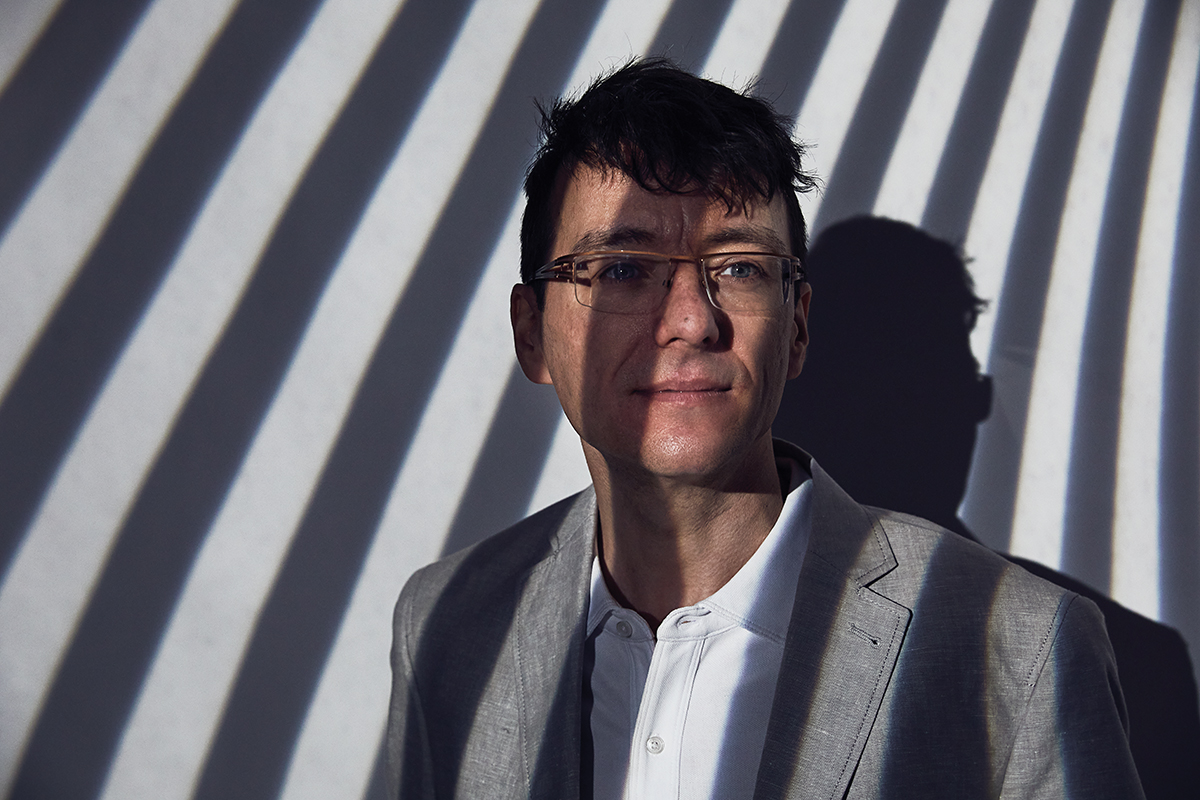
Imagine going to a genome lab and getting a full analysis of your DNA, just as easily as you’d go and get a blood test done. Imagine a world where a newborn is tested and the parents are given a genetic map — showing all of the potential ailments their child may encounter in their lifetime.
Dr. Mikolaj Raszek believes that the benefits of genome sequencing are too valuable for the world of medicine to ignore. Yes, there are sticky ethical questions that come with this technology. But, Raszek believes that the testing offered by the company he founded, Merogenomics, can change health care.
Raszek’s interest in genomic sequencing flourished as he was getting his doctorate in biochemistry at the University of Alberta. He also has a degree in genetics. Part of his work was to mutate DNA inside bacteria, and that inspired him to wonder if they could be manipulated to produce “any compound we wanted.”
If that sounds like mad science, imagine the applications that come with being able to sequence the DNA of humans.
We spoke to Raszek about Merogenomics and why he feels the benefits of sequencing far outweigh some of the ethical concerns.
ED: The application of genomics could totally change health care. For the layperson, what is it about genomics that could be so important down the road? How can spotting a mutation in someone’s DNA lead you to recognizing that the patient may have a specific health issue years down the road?
DR. RASZEK: Number one, it allows you to be pre-emptive. The genetics that you’re born with, in theory, should be identical in all your cells and, therefore, easily inspected. As long as you can link a biomarker — in my expertise that is, genetic mutation — to a specific outcome, you have a way of investigating information. That can go across a broad spectrum of outcomes. But, we’re interested in the outcomes related to your health… You can imagine that you can link certain mutations (variants) to diseases or health problems. It’s a very broad spectrum of what we can learn.

ED: OK, so what can we learn?
DR. RASZEK: Right now, the primary focus is mutations; when we encounter a single mutation, we will observe a health problem. Those are called Mendelian diseases. But we’re also looking outcomes where you have a combination of literally hundreds of mutations, and that creates a gradient of where health outcomes could be.
ED: And what does that mean, practically?
DR. RASZEK: You could decode your genome and, if you’re brave enough to face that information, you could find out that you have a predisposition to this condition or that condition, and that means you have to do this or that. That could mean you need to adjust the frequency of screening for a potential future outcome.
(Example: If the decoding tells a patient that there’s a likelihood of cancer down the road, that patient can make sure to take preventative steps.)
DR RASZEK: Sometimes, you can have a direct intervention. If you know there’s a mutation, you can step in and prevent the outcome.
ED: When you go to the doctor’s office, you are often asked for your family history. Any history of heart disease? Cancer? Is this sort of testing a far more advanced way of asking and finding answers to these questions?
DR. RASZEK: Let’s just go with heart disease, it’s a nice, all-encompassing, umbrella one. Within that, you start subdividing into different diseases of the heart. It can be tricky, because conditions of the heart can be genetic, but also influenced by the environment, like your diet. But, you hear of these bizarre anomalies like this super-athlete who suddenly dies of a heart attack. That’s a good example: That’s because some individuals have a genetic mutation that already predisposed them to having an enlarged heart. That means they probably should never have been doing excessive exercise because their heart was in danger. But they didn’t know that.
ED: It’s more than the potential for heart disease, though, that you can spot through mutations, correct?
DR. RASZEK: It’s a very broad spectrum, mental or neurological conditions, metabolic diseases. Literally, there are thousands of things you can investigate through one simple test, if you decode your genome.
ED: Is there anyone who is too young to be tested?
DR. RASZEK: You can test a fetus. You can literally look at a person’s genome before they are born. So, there is no age limit. We could access the material that has the genetic information of the fetus.
ED: But does that raise an ethical question?
DR. RASZEK: There is a strong calibre of ethics attached to this. With medical DNA testing or full genome sequencing, typically this is reserved for adults with informed consent. In children, testing is very important in pediatrics, but that’s usually reserved for ‘diagnostic’ purposes and not ‘screening’ purposes.
ED: What is the difference between ‘diagnostic’ and ‘screening?’
DR. RASZEK: You, as an adult, can get a full genome right now. Let’s presume you’re completely healthy. You don’t have to diagnose a specific disease, so, in your case, the full genome would be for screening purposes. You just want to see if there could be any problems. But what if you actually had a clinical outcome, or you know you have a health issue? Then, the test becomes diagnostic.
ED: But, do you feel it’s important that genome sequencing be available for minors?
DR. RASZEK: In pediatrics, it’s quite often difficult to diagnose patients on clinical symptoms alone. But, the majority of human diseases materialize early in life. But when you sequence the genome, approximately 50 per cent of the time you will be able to find out what the problem is, at least from a genetic point of view. It doesn’t mean that there’s a viable solution for the patient, but at least you have a diagnosis. You can use the test for diagnostic purposes in children. But, for screening? That’s considered unethical, because you remove the right from the child on how that information will be used and if they want to know any of that information. There’s a huge debate in scientific literature about that. With a fetus, you could do it if you see anomalies in the ultrasound and you see birth defects. That’s where the test is not ‘screening,’ it’s ‘diagnostic.’ It tells you what exactly is the problem and could allow the individual to make decisions, to potentially terminate pregnancy, which is legal in Canada, or it allows you to properly prepare for the birth, which can be terribly important.
ED: There are tests available for autism. Can that be unlocked through genomics?
DR. RASZEK: Definitely, there is a genetic component to autism. Autism belongs to the type of conditions known as ‘complex’ conditions — meaning they have multiple influencing factors. Those could include environment, but they definitely include genetics. Autism is one of those umbrella terms — it’s a syndrome, meaning it has a number of slightly different diseases. Genetically, you could start differentiating one type of autism from another. That can be really important, because that could alter the management of the condition. There is no treatment for autism, but you can alter the management of it. Autism is something, as a society, that we haven’t yet grasped. But we have this very powerful technology that could potentially precisely diagnose this condition, so that its management could be more refined. And the earlier you know the information, the greater the likelihood that the intervention will diminish the negative impacts of the condition.
ED: How accessible is the testing?
DR. RASZEK: In a few years, it’s gone from something that would have cost millions of dollars to being accessible to everyone. I’m on the fringes right now by starting to introduce this to clinics, but it will eventually be part of the health care system. It already is, except we use it sporadically. We don’t yet have a genome centre in Edmonton or in Alberta where we process all of the different patients. But it will be here one day, for sure. I would speculate, one day, every single human being will be sequenced upon birth. The reason why? Right now, we do newborn screens with a blood test. Automatically, you test newborns for a number of diseases. But, with genome sequencing, you can instantly test for thousands of conditions. You can see how valuable that can be, having that information up front.
ED: Can the value of the genome outlive the patient?
DR. RASZEK: One concept that is completely outside of the realm of our thinking is the fact that this information, once you decode it, the value outlives your lifespan. That information will be of value to multiple generations beyond your lifespan. Your great, great grandkid could have a condition and we can trace genetics from multiple generations. We can zero in on what genetics are involved in that child’s specific genetic condition. There is no grasp yet, that your genome will be of value to your family members well after you will die.
ED: What would you say to anyone who might be uncomfortable with the idea of unlocking the genome?
DR. RASZEK: Like any information we have, it can be used for good purposes or bad purposes. Of course, genetics can be used for horrible, horrible things. But that’s not of interest to me. I’m focused on the positive benefits, which is medicine.
CLOTHING PROVIDED BY SIMONS
This article appears in the May 2021 issue of Edify








